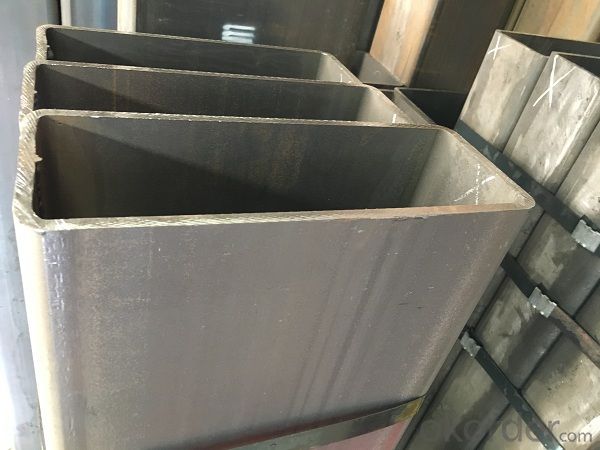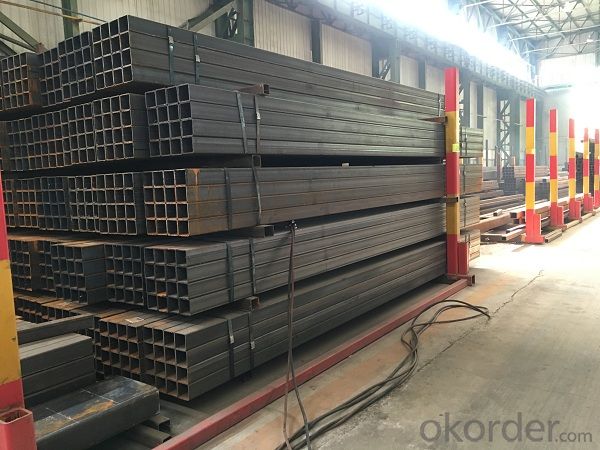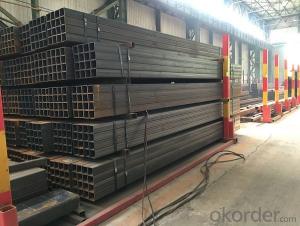Welding square tube with hot construction
- Loading Port:
- Tianjin
- Payment Terms:
- TT OR LC
- Min Order Qty:
- 25 m.t.
- Supply Capability:
- 15000 m.t./month
OKorder Service Pledge
OKorder Financial Service
You Might Also Like
Item specifice
1、 Welding square tube with hot construction
Square tube, square tube is a kind of call and rectangular tube, is equal and not equal to the length of steel pipe. Is the strip through the process of processing roll system. In general is the strip through the demolition of the package, flat, curly, welded to form a circular tube, and then rolled into a square tube and then cut into a square tube and then cut into the required length.
2、 Welding square tube with hot construction
• High manufacturing accuracy
• High strength
• Small inertia resistance
• Strong heat dissipation ability
3、 Selling building many types of square tube
Standard | GB, DIN, ASTM |
Grade | 10#-45#, 16Mn 10#, 20#, 45#, 16Mn |
Thickness | 1.5 - 25 mm |
Section Shape | Square and rectangular |
Outer Diameter | 20*20 mm-------400*400mm 20*30mm*300*500mm |
Place of Origin | Tianjin, China (Mainland) |
Length | 3-12M |
Outer Diameter | 20*20 mm-------400*400mm 20*30mm*300*500mm |
Grade | 235B 345B |
Standard | ASME, ASTM |
1) Material:(ASTM A 106/A53 GRB.API5LGRB,GB,235B,345B
2) Specification range:OD: 20*30mm----300*500mm 20*20 mm---400*400mm ,WT: 1.5 - 25 mm ,length:3-12m or according to the requirement of clients.
3) Excutive standards:GB,ASME API5L.ASTM A 106/A53,Despite of the above
4) Surface:black lacquered,varnish coating or galvanized.
5) Ends:Beveled or square cut ,painted.
6) Packing:bundles wrapped with strong steel strip,seaworthy packing.
4、Packaging & Delivery
Packaging Details: | seaworthy package,bundles wrapped with strong steel strip |
Delivery Detail: | 15-30days after received 30%TT |
5、 Selling building many types of square tube
①How is the quality of your products?
Our products are manufactured strictly according to national and internaional standard, and we take a test
on every pipe before delivered out. If you want see our quality certifications and all kinds of testing report, please just ask us for it.
Guaranteed: If products’ quality don’t accord to discription as we give or the promise before you place order, we promise 100% refund.
②How about price?
Yes, we are factory and be able to give you lowest price below market one, and we have a policy that “ for saving time and absolutely honest business attitude, we quote as lowest as possible for any customer, and discount can be given according to quantity”,if you like bargain and factory price is not low enough as you think, just don’t waste your time.Please trust the quotation we would give you, it is professional one.
③Why should you chose us?
Chose happens because of quality, then price, We can give you both.Additionally, we can also offer professional products inquiry, products knowledge train(for agents), smooth goods delivery, exellent customer solution proposals.Our service formula: good quality+good price+good service=customer’s trust
SGS test is available, customer inspection before shipping is welcome, third party inspection is no problem.
6、 Selling building many types of square tube


- Q:What is the difference between cast iron and steel pipes?
- Cast iron and steel pipes are both commonly used in plumbing and construction applications, but they differ in several key aspects. 1. Composition: Cast iron pipes are made of a predominantly iron alloy, with small amounts of carbon and other elements. On the other hand, steel pipes are primarily composed of iron, but they also contain varying amounts of carbon and other alloying elements such as manganese, chromium, and nickel. 2. Strength: Steel pipes are generally stronger than cast iron pipes due to their higher carbon content and alloying elements. This makes steel pipes better suited for high-pressure applications or areas with heavy loads. 3. Flexibility: Steel pipes have more flexibility than cast iron pipes, allowing for easier installation and adjustment. Cast iron pipes, due to their brittleness, are less flexible and more prone to cracking or breaking if subjected to excessive stress or impact. 4. Corrosion resistance: Steel pipes are typically more susceptible to corrosion than cast iron pipes. However, this can be mitigated through various protective coatings or treatments applied to the steel pipes. Cast iron pipes, on the other hand, have inherent corrosion resistance due to the formation of a protective layer of rust on their surface. 5. Noise insulation: Cast iron pipes have excellent noise insulation properties due to their dense and heavy composition. This makes them ideal for applications where noise reduction is desired, such as in residential plumbing systems. Steel pipes, being lighter and less dense, do not offer the same level of noise insulation. 6. Longevity: Cast iron pipes have a long lifespan and can last for over 100 years when properly maintained. Steel pipes, while still durable, may have a shorter lifespan depending on factors such as the quality of the steel used, environmental conditions, and maintenance practices. In summary, the main differences between cast iron and steel pipes lie in their composition, strength, flexibility, corrosion resistance, noise insulation, and longevity. The choice between the two will depend on the specific requirements of the application, such as the desired strength, durability, and noise reduction properties.
- Q:Are steel pipes affected by UV rays?
- Yes, steel pipes can be affected by UV rays. Exposure to UV rays can cause the steel to degrade and corrode over time. Therefore, it is important to protect steel pipes from direct sunlight and UV radiation to prolong their lifespan and maintain their structural integrity.
- Q:Can steel pipes be used for transporting gases?
- Yes, steel pipes can be used for transporting gases. Steel pipes are commonly used for various applications including the transportation of gases due to their durability, high tensile strength, and resistance to corrosion. They are often preferred for transporting gases over other materials due to their ability to withstand high pressure and temperature conditions.
- Q:What are the common sizes of steel pipes?
- The common sizes of steel pipes vary widely, but some common diameters range from 1/8 inch to 36 inches, with wall thicknesses typically ranging from Schedule 10 to Schedule 160.
- Q:How are steel pipes used in offshore wind farms?
- Steel pipes are used in offshore wind farms for a variety of purposes. They are commonly used as foundation structures to support wind turbine towers, providing stability and strength in the harsh marine environment. Steel pipes are also used for subsea cables and pipelines, allowing for the transportation of electricity and other resources. Additionally, they play a crucial role in the installation of offshore wind turbines, serving as installation aids and providing access for maintenance and repair activities. Overall, steel pipes are essential components in the construction, operation, and maintenance of offshore wind farms.
- Q:What are the specific differences between flexible pipes and rigid pipes?
- Choose from the waterproof performance:A rigid waterproof sleeve is a steel pipe with an outer wing (a steel ring made of a steel ring), mounted in the wall (mostly concrete walls), used for general pipe wall crossing, and is beneficial to the waterproof of the wall;The flexible waterproof casing except external wing ring, flange ring and internal wire like, and have complete sets sold, but also their own processing, for pipeline damping needs, such as pipes and pumps connected through walls.
- Q:Can steel pipes be used for the construction of tunnels?
- Yes, steel pipes can be used for the construction of tunnels. Steel pipes are often used as support structures in tunnel construction due to their strength, durability, and ability to withstand high pressures. They can be used for various purposes such as drainage, ventilation, or as part of the tunnel structure itself. Additionally, steel pipes can be easily manufactured, transported, and installed, making them a popular choice in tunnel construction projects.
- Q:Can steel pipes be used for oil drilling operations?
- Yes, steel pipes are commonly used for oil drilling operations. They possess the necessary strength and durability to withstand the harsh conditions of drilling and transporting oil. Additionally, steel pipes have excellent corrosion resistance, making them suitable for long-term use in the oil and gas industry.
- Q:What is the difference between steel pipes and PVC-O pipes?
- Steel pipes and PVC-O pipes differ in their composition, strength, and durability. Steel pipes are made from a combination of iron and carbon, making them extremely strong and resistant to high-pressure applications. However, they are susceptible to corrosion and may require regular maintenance. On the other hand, PVC-O pipes are made from a specialized form of polyvinyl chloride, which enhances their strength and durability while being corrosion-resistant. PVC-O pipes are also lighter, easier to install, and have a longer lifespan compared to steel pipes. Overall, while steel pipes excel in strength, PVC-O pipes offer a more cost-effective and durable solution for various plumbing and industrial applications.
- Q:When can I use the PVC pipe and when to use the galvanized pipe?
- PVC pipeline use temperature is -5 to 90 degrees or so, according to the current market price of around 6000 yuan per ton, the price is cheap. Its corrosion resistance is good, can resist most of the acid and alkali, and unlike the steel pipe that is easy to rust, so in the construction of the upper and lower water pipes and other fields have gradually replaced the trend of steel pipe.
1. Manufacturer Overview |
|
|---|---|
| Location | |
| Year Established | |
| Annual Output Value | |
| Main Markets | |
| Company Certifications | |
2. Manufacturer Certificates |
|
|---|---|
| a) Certification Name | |
| Range | |
| Reference | |
| Validity Period | |
3. Manufacturer Capability |
|
|---|---|
| a)Trade Capacity | |
| Nearest Port | |
| Export Percentage | |
| No.of Employees in Trade Department | |
| Language Spoken: | |
| b)Factory Information | |
| Factory Size: | |
| No. of Production Lines | |
| Contract Manufacturing | |
| Product Price Range | |
Send your message to us
Welding square tube with hot construction
- Loading Port:
- Tianjin
- Payment Terms:
- TT OR LC
- Min Order Qty:
- 25 m.t.
- Supply Capability:
- 15000 m.t./month
OKorder Service Pledge
OKorder Financial Service
Similar products
New products
Hot products
Related keywords





























